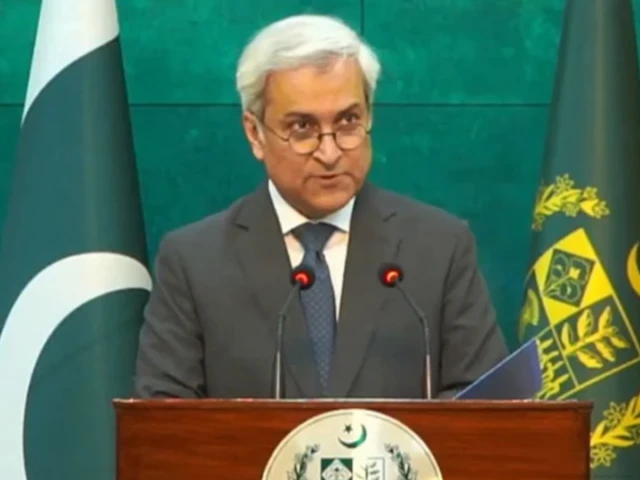Islamabad says regional connectivity possible only after Kabul acts against terrorist havens
ISLAMABAD:
The Foreign Office made it clear on Friday that no meaningful trade or economic engagement with Afghanistan can take place as long as the Afghan Taliban regime continues to harbor and support terrorist groups targeting Pakistan.
The statement followed remarks by the Taliban regime ordering local businessmen to trade with countries other than Pakistan and warning that they would not be liable for any consequences if the traders continued their dealings with Pakistan.
During his weekly press briefing, Foreign Ministry spokesperson Tahir Hussain Andrabi stressed that Pakistan remains committed to regional trade and connectivity, but these efforts cannot coexist with cross-border terrorism.
“Pakistan is a strong supporter of regional trade and connectivity,” he said.
“We have made a number of trade concessions to Afghanistan, but these positive gestures have not been responded to by the Afghan Taliban regime, which continues to actively harbor and support elements committing terrorism against Pakistan from Afghan soil.”
The spokesperson clarified that human lives take precedence over commercial and economic considerations. “Trade and transit with Afghanistan is only possible if the Afghan Taliban regime takes clear action against anti-Pakistan elements operating from its territory.”
The recent terrorist attacks in Islamabad and Wana have highlighted the seriousness of the threat emanating from Afghan soil.
Referring to the attacks in Wana and Islamabad, the spokesperson said: “Both incidents had deep Afghan imprints. In the Islamabad attack, an Afghan national was the suicide bomber. So let this reality sink in in Kabul. He stressed that Pakistan will take all necessary measures to protect its people and will continue to hold Afghanistan responsible for terrorists operating from its territory.
The spokesperson also discussed Pakistan’s continued engagement with the Afghan Taliban regime through dialogue and mediation. While Pakistan remains committed to peacefully resolving bilateral disputes, Andrabi warned that dialogue cannot continue without concrete action against groups such as the TTP and Fitnah-Al-Khawaraj (FaK).
“Pakistan’s main concern, terrorism emanating from Afghanistan, must be addressed first. We cannot ignore the loss of lives of Pakistanis at the hands of Afghan nationals and these terrorist elements,” he said.
Regarding claims that the Afghan Taliban are powerless against the TTP, the spokesperson dismissed these statements as untenable. “The argument that they are powerless against the TTP is not credible. The Taliban regime claims control of its entire territory, and yet attacks on Pakistan continue to be orchestrated from Afghan soil,” he said, emphasizing that Afghan nationals involved in these attacks bear responsibility alongside the groups they shelter.
The spokesperson noted that Pakistan and the United States share multifaceted cooperation in the defense, trade, economic and social sectors, and efforts are underway to further strengthen this comprehensive partnership.
Furthermore, the spokesperson highlighted Pakistan’s position on the Indus Waters Treaty arbitration with India. Following the recent court ruling, he reiterated that India’s decision to suspend its participation in the neutral expert procedure is illegal and does not prevent the process from moving forward.
He condemned India’s handling of the Red Fort blast in Delhi and the subsequent crackdown on Kashmiri citizens, describing it as a politically motivated diversion. The spokesperson noted: “India continues to use terrorism as a scarecrow to distract from its internal challenges, while targeting Muslims, particularly Kashmiris, in a systematic campaign of repression.”




